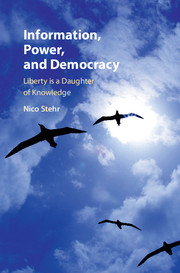Book contents
- Frontmatter
- Contents
- List of figures
- List of tables
- Introduction
- 1 Coming to terms
- Excursus: How much knowledge does democracy need, and how expensive should it be?
- Excursus: An inconvenient democracy: knowledge and climate change
- 5 The knowledge of the powerful
- 6 The knowledge of the weak
- Knowledge and democracy: summary and conclusions
- Bibliography
- Index
6 - The knowledge of the weak
from Excursus: An inconvenient democracy: knowledge and climate change
Published online by Cambridge University Press: 05 December 2015
- Frontmatter
- Contents
- List of figures
- List of tables
- Introduction
- 1 Coming to terms
- Excursus: How much knowledge does democracy need, and how expensive should it be?
- Excursus: An inconvenient democracy: knowledge and climate change
- 5 The knowledge of the powerful
- 6 The knowledge of the weak
- Knowledge and democracy: summary and conclusions
- Bibliography
- Index
Summary
The state … derives no inconsiderable advantage from [the] instruction [of the inferior ranks of the people]. The more they are instructed the less liable they are to the delusions of enthusiasm and superstition, which, among ignorant nations, frequently occasion the most dreadful disorders … They are more disposed to examine, and more capable of seeing through, the interested complaints of faction and sedition, and they are, upon that account, less apt to be misled into any wanton or unnecessary opposition to the measures of government.
Adam Smith [1776] 2000)Die Lethargie dem Staat gegenüber ist keine Naturqualität, sondern wird zergehen, sobald dem Volk vor Augen steht, daß es wirklich selber der Staat ist und daß dieser kein spezialistisches Ressort der Politik bildet, das Fachleute für den Rest der Menschheit verwalten sollen.
Theodor W. Adorno ([1951] 1986:292)The practice of democracy requires, following the ideal conception of democracy, the “development” and the presence of an “intelligent” public capable of raising, engaging in, comprehending and deciding on political issues. What exactly does such an ideal and such a practice mean? Does it mean, as George H. Mead (1923:244–245) stipulates, that the “advance in the practice and theory of democracy depends upon the successful translation of public policy into the immediate problems of the citizens”? Or does the ideal of democratic governance call for the participation of the possibly largest number of enlightened individuals in the political affairs of a society?
If one follows, on the other hand, the prevailing view of attributes of the practice of democracy, and some observers would surely assert that such a claim is a realistic perspective, one tends to encounter a liberal mix of four arguments: (1) Not only is knowledge power but the powerful are knowledgeable; (2) the public is ignorant; (3) the exercise of power is cemented through the control of relevant scientific findings by the powerful; and (4) the effective political participation of citizens is therefore seriously damaged. These arguments are not easily separated.
- Type
- Chapter
- Information
- Information, Power, and DemocracyLiberty is a Daughter of Knowledge, pp. 243 - 335Publisher: Cambridge University PressPrint publication year: 2015



